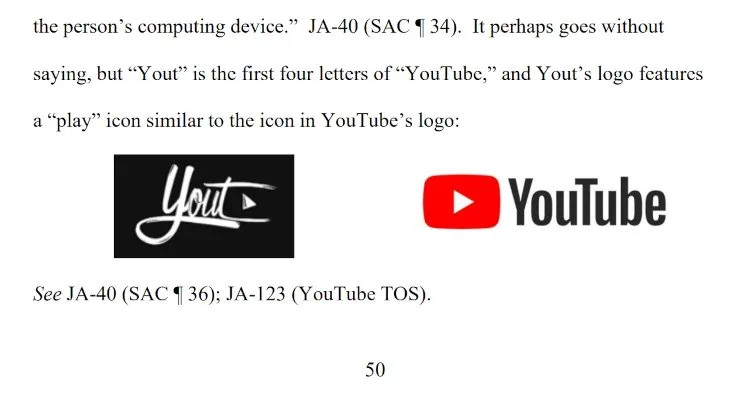Amid a courtroom confrontation with Yout, the RIAA’s legal team went ahead and highlighted the alleged similarities between the names and logos of the stream-ripper and YouTube. Photo Credit: Digital Music News
As Hartford-based stream-ripper Yout appeals the dismissal of its long-running lawsuit against the RIAA, the industry representative is firing back against the action’s “implausible claims” and urging the appellate court to affirm the prior rulings.
The Recording Industry Association of America (RIAA) just recently took aim at Yout’s appeal in a detail-oriented 60-page answering brief. Last time we checked in on the marathon case, which Yout initiated in October of 2020, GitHub and the Electronic Frontier Foundation in February filed amicus briefs. January had seen the court reject an RIAA motion to make the plaintiff cough up $250,000 or so in legal fees.
“Here, I choose to exercise my discretion to deny the fee motion without prejudice and grant the RIAA leave to re-file the motion upon resolution of the appeal,” Judge Stefan R. Underhill explained of the decision, which followed the dismissal of Yout’s case in 2021 and then with prejudice in September of 2022.
In the actions, Yout maintained (among other things) that the RIAA had sent to Google takedown notices containing misrepresentations, thereby violating the DMCA. These alleged misrepresentations, for their part, ultimately hinged (and hinge) upon whether Yout does in fact circumvent YouTube’s “rolling cipher” anti-piracy technology.
Predictably, the stream-ripper says that it doesn’t do so, but rather automates a download process that users can easily execute on their own via web browsers. Plus, Yout has accused the RIAA of defamation per se, claiming that the takedown notices caused third parties to believe that it had “engaged and continues to engage in illegal and unlawful conduct.”
Now, the RIAA has set its sights on expediting the “resolution of the appeal,” making clear the belief that the “district court’s opinion was correct on all counts” and “is in line with multiple courts that have found similar stream-ripping technology unlawful.”
As in previously submitted legal documents, the RIAA in the highlighted answer doubled down on the idea that its takedown notices are legitimate because the nature of Yout’s operations constitutes a violation of the DMCA.
“To establish its entitlement to declaratory relief under Section 1201,” the RIAA’s legal team spelled out, “Yout would have to prove that it does not violate any of the prohibitions of that statute. The reality is that it violates all of the prohibitions. … YouTube’s limited streaming access is fundamentally different from providing unrestricted access to downloadable files.”
Also in keeping with its prior arguments, the RIAA explored in detail the belief that the DMCA section it’s alleged to have violated concerns misrepresentations relating only to copyright – not “circumvention.” And in any event, even if the appropriate section did apply in this instance, the RIAA denies having “actual knowledge” of the alleged misrepresentation, according to the answer, about which TorrentFreak likewise reported.
Meanwhile, legal precedent “overwhelmingly supports” the RIAA, the organization indicated, pointing to other stream-ripper lawsuits involving the major labels as well as international courts’ purported determinations “that Yout’s service violates those countries’ equivalents to the DMCA.”
“Yout’s service is not a neutral camera or audio-recording device that exists separate from the technology it circumvents; it enables users to obtain a virtually perfect copy of the file,” the RIAA drove home. “The service’s entire purpose is circumvention.”
At the time of this writing, Yout (whose founder is “done” with Twitter) didn’t appear to have taken to social media to address the RIAA’s answer. But the music industry is continuing to target stream-rippers on the global stage, including platforms operating and/or based in Germany and India.

